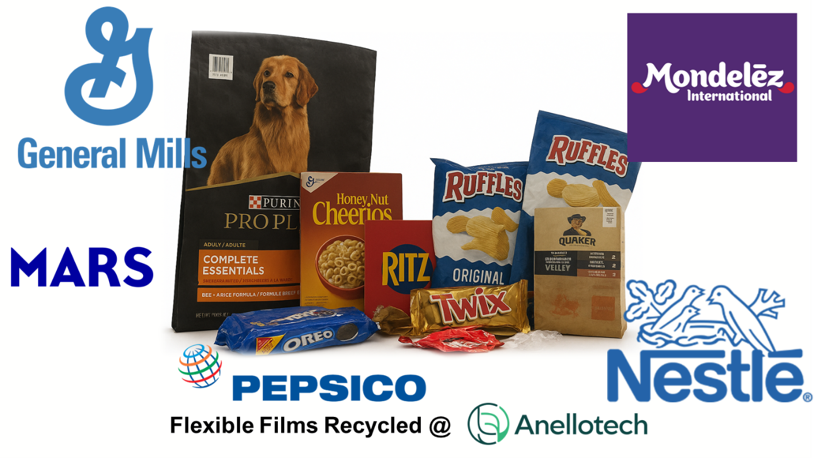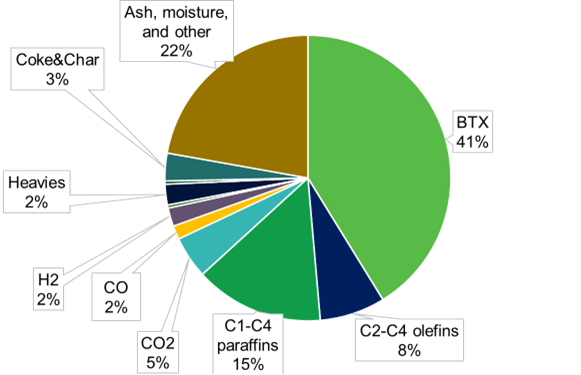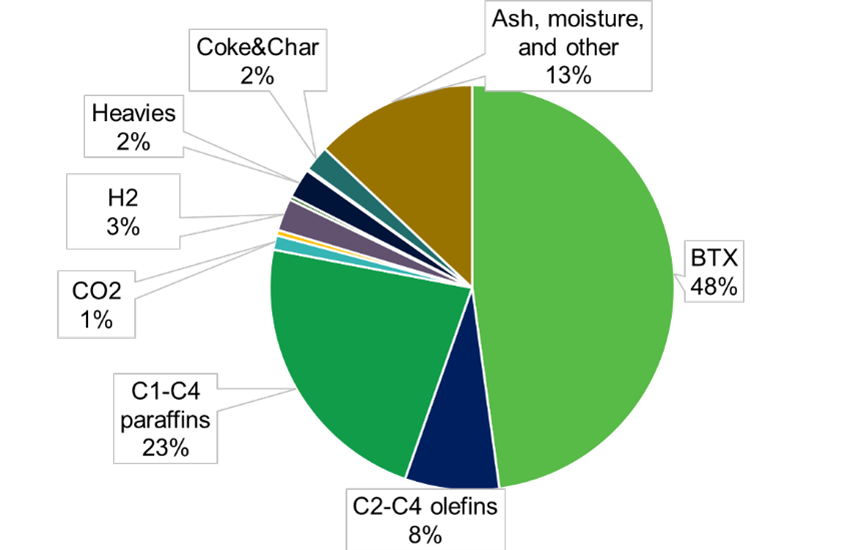Anellotech Demonstrates Scalable Chemical Recycling Solution for Flexible Film Packaging
October 9, 2025

Executive Summary
Flexible films used in snack wrappers, pouches, and food packaging represent one of the largest and most difficult fractions of plastic waste to recycle. Anellotech’s Plas-TCat® catalytic cracking technology offers a breakthrough solution by converting these mixed, multilayer, and contaminated plastics directly into the same high-value chemicals (benzene, toluene, xylenes, and light olefins) used to make new plastics. Recent laboratory and pilot-scale demonstrations using real packaging from major brands (including Nestlé, PepsiCo, General Mills ,Mars, and Mondelez) achieved over 50% yields of BTX and light olefins, confirming the process’s ability to handle complex, unsorted feedstocks without intensive preprocessing. As U.S. states implement Extended Producer Responsibility (EPR) laws requiring brand owners to fund recycling of their packaging, Plas-TCat provides a scalable, economical, circular pathway to meet these mandates, transforming flexible films from an environmental challenge into a sustainable source of virgin-quality chemicals.
Demonstration of Flexible Film Chemical Recycling Using Plas-TCat
Anellotech has conducted extensive R&D and pilot work directly relevant to processing flexible films. At the lab scale, we have tested dozens of waste-plastic materials, including multicomponent U.S. food packaging films(e.g., snack and confectionery wrappers, with and without an aluminum barrier layer) and LLDPE films from a meat-processing facility which we intend to process at our 200,000 kg/year pre-commercial plant in Texas. Across these trials, waste plastics are consistently converted into benzene, toluene ,xylenes (BTX) and light olefins, with yields dependent on polymer composition: Polyolefins (PE, PP, LDPE): give the highest yields. Oxygen-containing plastics(PET, PC): lower yields as oxygen exits as CO/CO₂. Nitrogen-containing plastics(nylon, polyurethane, ABS): lower yields as nitrogen forms NH₃, but the BTX remain free of nitrogen and oxygen, eliminating the need for hydrotreating.

In a case study using brands associated with the US Flexible Films Initiative members (Nestle, PepsiCo, General Mills, Mars, and Mondelez), flexible film packaging was recovered from products purchased by Anellotech at New York area grocery stores[1].The plastic packaging (from Cheerios, Oreo, Purina Dog Chow, Twix, KitKat, Ritz Cracker, Quaker Oats Instant Oatmeal Cinnamon Spice packet, Ruffles Potato Chips, Figure 1) was gently cleaned (no intensive sorting or washing step required) and milled. The eight milled films were blended in equal amounts, making a true waste plastic mixture for Plas-TCat catalytic conversion testing.
Product yield was determined using Anellotech’s lab scale catalytic cracking reactor, which has been developed and validated as a feedstock screening tool for commercial-scale Plas-TCat production. Figure 2 demonstrates the recovery of products from flexible films when used as feedstock for Plas-TCat. The mixture of flexible films (Fig. 2a) and one single-stream flexible film (Fig. 2b) yielded approximately 50% BTX and light olefins and 15-20% paraffins that can be converted to light olefins via steam cracking. The ash content includes aluminum and other inert materials added to the plastic to provide moisture barrier and other physical properties. These are efficiently removed and recovered within the Plas-TCat process. The coke and char fraction are retained and combusted in the regenerator of the Plas-TCat process to provide heat for the process.

1 Brands were not involved in any way with this feasibility demonstration.

Figure2. Product yield reported as wt% of flexible films tested in lab-scale demonstration of Plas-TCat catalytic cracking technology
Flexible Film Recycling in the U.S., Framed by EPR
Flexible films—grocery bags, snack wrappers, food overwraps, pouches, and metallized laminates—represent one of the most visible and technically challenging categories of plastic waste. These materials are lightweight, low-cost, and essential to food safety and shelf life, but their design makes them fundamentally difficult to recycle. Many films are composed of multiple polymers, combined with inks, adhesives, or thin metallic layers that improve performance but prevent mechanical recyclers from processing them at scale. Films also behave poorly in material recovery facilities (MRFs), wrapping around machinery and contaminating higher-value streams. As a result, only a small fraction of U.S. households have curbside access to film recycling, and most flexible packaging ends up in landfill, incineration, or underperforming store drop-off programs.2
At the same time, policy is changing the economics of plastic waste management. Extended Producer Responsibility (EPR) for packaging—laws that require brand owners and producers to finance the collection, sorting, and recycling of their products—are beginning to take hold in the U.S. Several states, including California, Oregon, Colorado, and Maine, have passed packaging EPR legislation, with others actively considering similar measures. California’s SB 54 is particularly significant, mandating ambitious recyclability and recovery targets, including a 65% recycling rate for specified plastic packaging by 2032and creating dedicated producer-funded mechanisms to upgrade and/or provide new recycling
2 Film and Flexibles Coalition - The Recycling Partnership
infrastructure. For the first time, producers will not only be responsible for the design of flexible films but also for ensuring those materials have viable end-of-life solutions.3
What EPR highlights is that flexible film recycling is not solely a technical issue, but a systems problem. The bottleneck lies in three areas: (1)inadequate collection and preprocessing infrastructure, (2) the incompatibility of multilayer films with mechanical recycling technologies, and (3) the need for robust, scalable end-markets for recovered materials. Producer funding under EPR, however, offers a unique opportunity to address these bottlenecks simultaneously, supporting targeted collection pilots, MRF upgrades, design-for-recyclability incentives, and the deployment of advanced recycling technologies capable of handling mixed and complex feedstocks.
This is where Anellotech’s Plas-TCat® technology provides a breakthrough. Designed to process heterogeneous plastic waste, including contaminated and multilayer flexible films, Plas-TCat uses a single-step catalytic cracking process to convert mixed plastics directly into light olefins and aromatics (BTX), the same building blocks used to make virgin plastics. Unlike mechanical recycling and traditional thermal pyrolysis processes, which struggle with multilayer films (including layers of oxygenated or aminated plastic like PET and polyamides) and contamination, Plas-TCat can handle these streams with minimal preprocessing, creating a true closed-loop pathway for materials that would otherwise be discarded.
By aligning with the funding and accountability structures that EPR legislation is bringing to the U.S., Plas-TCat offers a scalable and economically viable solution to one of the most persistent challenges in plastic waste management. Flexible films, long considered “unrecyclable,” can now become a feedstock for circular manufacturing, transforming an environmental liability into a source of sustainable raw materials for the plastics industry.
Conclusion
Flexible films are an essential but under-addressed component of the plastic waste challenge. Through its one-step catalytic process, Anellotech’s Plas-TCat technology delivers a proven, scalable route to convert mixed and multilayer flexible films into the same high-purity chemicals used to make new plastics. As EPR legislation reshapes how packaging waste is managed, Plas-TCat stands ready to enable brand owners and producers to meet recycling mandates while advancing true circularity in the plastics value chain.
3 SB 54: Plastic Pollution Prevention and Packaging Producer Responsibility Act - CalRecycleHome Page
For further information, please contact:
David Sudolsky, CEO and President
About Anellotech, Inc.
Anellotech is a circular-chemicals technology company commercializing Plas-TCat, a one-step catalytic cracking process that converts mixed waste plastics, including hard-to-recycle flexible and composite films, directly into the same basic chemicals used to make new plastics (benzene, toluene, xylenes, ethylene and propylene). In 2020, Anellotech partnered with R Plus Japan, a consortium of 48 member companies across consumer goods, chemicals, and waste management, to further develop and commercialize Plas-TCat technology to enable true circularity. Anellotech also partners with Technip Energies for development and licensing of Plas-TCat.
News & Media
Anellotech Earns FIA Sustainability Certification for Use in Advanced Low-Carbon Fuels for Formula 1
October 29, 2025
Read moreAnellotech Demonstrates Scalable Chemical Recycling Solution for Flexible Film Packaging
October 9, 2025
Read moreRecycling Multi-layer Plastic Food Packaging — Harvest Snaps
September 19, 2025
Read more